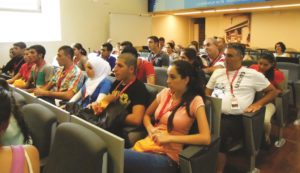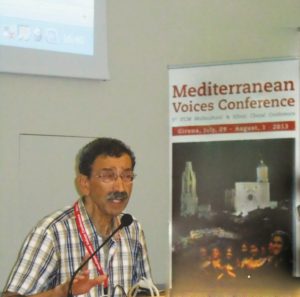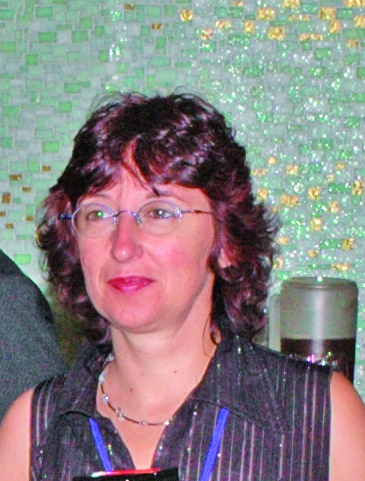Voces del Mediterráneo
V Conferencia Coral, Multicultural y Étnica de la FIMC, Girona, 2013
por Theodora Pavlovitch, Vicepresidenta de la FIMC, directora coral y profesora
Mare Nostrum (nuestro mar).De esta manera ha sido llamado el Mediterráneo durante siglos. Este término romano siempre ha expresado el cariño de la gente hacia esta área hermosa, colorida, inusual y llena de contrastes. «De los tres cuartos del globo, el Mar Mediterráneo es similarmente el elemento de unión y el centro de la Historia Universal»(Georg Wilhelm Friedrich Hegel La Filosofía de la Historia,p. 87.Dover Publications Inc., 1956). La ubicación única entre tres continentes: Europa, África y Asia (Medio Oriente), el clima templado y una tierra exuberante a su alrededor, han hecho del Mar Mediterráneo la cunade diferentes civilizaciones, un punto de encuentro de ricas culturas y una importante ruta para el comercio y el intercambio cultural entre los pueblos de la región.Las tradiciones culturales y musicales de esta área geográfica son cruciales para entender los orígenes y el desarrollo de muchos fenómenos culturales, y no es de extrañar que esta región en concreto fuese elegida como anfitriona de la VConferencia Coral Multicultural y Étnica de la FIMC.Luego de que su original concepto musical y científico fuese establecido, el evento recibió un buen apoyo financiero del Programa Cultural de la Unión Europea y también delaConcejalía de Cultura conjuntamente con el Gobierno de Cataluña (Generalitat de Catalunya) gracias a los esfuerzos de la Asociación Coral Europea«Europa Cantat» (un miembro fundador de la FIMC), el Moviment Coral Català (la organización coral«paraguas»de Cataluña, un anfitrión de la Conferencia) y la Oficina Mediterránea de Canto Coral.
El programa de la Conferencia fue planteado para abarcar todas las culturas musicales que fueseposible. Con 22 países de 3 continentes diferentes, 3 grupos de las principales religiones (cristianos, musulmanes y judíos)incluyendo sus vertientes, con enormes diferencias económicas y políticas y una inmensa diversidad en la región, ¡fue todo un reto establecer la estructura de este evento único! Y el resultado fue realmente asombroso: en los cuatro días del evento los participantes y los invitados oficiales pudieron asistir a 9 conciertos, 7 sesiones plenarias, 3 sesiones bajo el título de «Descubriendo el Repertorio Mediterráneo» y 3 sesiones de proyección de documentales (preparados por Dolf Rabus, Director del Festival Internacional de Música Sacra y miembro del Comité Artístico de la Conferencia de Voces del Mediterráneo).
El programa de conciertos del evento presentaba una gran diversidad en las prácticas de canto y las tradiciones de esta inusual región. Al principio había un sonido mágico «pintando»: La Voz de las Campanas, creación del compositor Llorenc Barber, una música espléndida y milagrosa ejecutada por las campanas de todas las iglesias de Girona. Esto inspiró una sensación burbujeante de festividad y alegría para toda la gente de la ciudad: participantes en el evento, ciudadanos y turistas. Bajo el título de «Balcón hacia el Mar», el concierto de la primera noche comenzó con maravillosas presentaciones de dos coros de Girona: Cor de Cambra de la Diputació de Girona (dirigido por Pablo Larazz) y el Coro Juvenil Claudefaula (dirigido por Quim Bonal), un regalo de bienvenida de parte de la ciudad anfitriona, seguido por el Coro Fayha proveniente del Líbano (dirigido por Barkev Taslakian), el coro que más activamente participó en todo momento en la Conferencia. Uniendo a cantantes musulmanes y cristianos, este coro es significativo por su repertorio específico y su alta calidad de canto,pero también por su concepto espiritual y humano.Proveniente de un país donde hace apenas unos años los coros no existían, Fayha no es solo un coro: es un mensaje para las naciones, para los diferentes grupos étnicos y religiosos, un mensaje para la paz y el entendimiento mutuo. Y el director Barkev Taslakian se las arreglado para hacer algo que generaciones de diplomáticos y políticos aún no han podido lograr.

Un genuino clímax del programa de conciertos y la mayor sorpresa para todos nosotros fue elCor Jove Nacional de Catalunya (el nuevo Coro Juvenil Nacional de Cataluña), creado hacía apenas unas semanas. Sus «padres»,Moviment Coral Català y De Corals Joves de Catalunya(la Federación Coral Juvenil Catalana) anunciaron: «El Cor Jove Nacional de Catalunyatiene una doble meta: ofrecer a los jóvenes cantantes de coro y estudiantes de canto la oportunidad de trabajaren un proyecto pedagógico con un entorno de música coral de alto nivel y con los mejores directores de Europa. El segundo objetivo es darle a nuestro país una nueva y útil herramienta que contribuya a mejorar la situación y el prestigio de los coros y cantantes corales entre jóvenes y adultos, y también de todos los coros de Cataluña». Dos directores de fama mundial han sido seleccionados para trabajar con el coro: Vytautas Miskinis (Lituania) y Xavier Puig (Cataluña, España). Ellos habían preparado para el concierto de estreno del coro un programa emocionante y de alta calidad musicalbasado en piezas del mismo Vytautas Miskinis para la primera parte del concierto, y una selección de tonadas tradicionales catalanas influenciadas por la música árabe y arregladas por diferentes compositores para la segunda parte del concierto.
Otros muchos coros y grupos presentaron sus tradiciones nacionales en el marco de la Conferencia de Voces del Mediterráneo: el asombroso grupo marroquíEls mediadors de Deu (director Abdelaziz Benabdeljalil), el Coro Samaritano Israelita (director Benyamin Tsedaka), La Nova Euterpe Vocal Ensemble (director Jaume Ayats) de Cataluña y el grupo Cant d’Estil (Valencia, España), el Gruppo Spontaneo Trallalero de Liguria (Italia) y finalmente Novi Sad Chamber Choir de Serbia (director Bogdan Djakovich).
Una brillante selección de cantantes estrella nos brindaron la oportunidad de acercarnos un poco más a las tradiciones vocales únicas de España: Antonio Campos y Juan Antonio Suárez «Cano», undúo de Andalucía, Mateu Matas «Xuri» de Mallorca, Josep Antoni Aparicio «Apa» y Josemi Sánchez,de Valencia. ¡Un concierto profundamente emotivo seguido por un espontáneo concurso de canto al final de este inolvidable maratón de conciertos!
La parte científica de la Conferencia de Voces Mediterráneas consistía en siete sesiones plenarias ofrecidas por el Departamento de Educación y Psicología junto con la Universidad de Girona. Los temas «Monodias tradicionales en el canto sagrado» presentado por Youssef Tannous (Líbano), Juan Carlos Asensio (España) y Fethi Zhgonda (Túnez) y «Canto de partes múltiples en la tradición sacra y secular» por Ignazio Macchiarella (Italia) fueron seguidos por «Cantar en las islas»(Ignazio Macchiarella, Jaume Escandell, Francesc Vicens y Jordi Alsina), «Cantar, para decir, canto improvisado» (Josemi Sánchez y Jaume Ayats), «Ressons de l’al-Andalus» (Xavier Puig y Fethi Zghonda), «Cantar para rezar» (Abdelaziz Benabdejalil y Bogdan Djakovic) y «Voces Ibéricas»(Jaume Ayats). Todos los temas habían sido extremadamente bien preparados y demostraron el conocimiento y alto nivel científico de los ponentes.

Las sesiones de Descubriendo el Repertorio Mediterráneo guiaron a los participantes a través de diferentes estilos musicales –desde piezas de los maestros catalanes Carles Gumi y Lluis Guzmán (presentados por Xavier Boulies y Montserrat Cadevall, Presidente de la Federació Catalana d’Entitats Corals) hasta los nuevos arreglos de viejas canciones populares catalanas desconocidas (presidida porXell Montserrat) de compositores de diferentes países mediterráneos: Carlo Pavese (Italia), Edward Torikian (Líbano) y Thomas Louziotis (Grecia), una idea original delSecretariat de Corals Infantils de Catalunya. En la sesión final los compositores presentaron también algunas de sus más recientes piezas y el Coro Fayha presentó música en vivo de Edward Torikian y Barkev Taslakian, director del coro.
Una nueva visión de la variedad de tradiciones y tendencias modernas, de las influencias específicas y reflexiones de la cultura vocal de los países circundantes al Mar Mediterráneo. Muchos momentos mágicos de descubrimientos, invenciones y valioso conocimiento mutuo. ¡Muchas gracias Cataluña, Moviment Coral Català, Presidente Marti Ferrer i Bosch y su equipo, por la cálida hospitalidad, el excelente manejo logístico y el fantástico espíritu del evento! De seguro esta no será la última Conferencia de Voces del Mediterráneo en esta espectacular área. ¡Nos veremos pronto, pueblo del Mare Nostrum!

Theodora Pavlovitch is a Professor in Choral Conducting at the Bulgarian National Academy of Music and at Sofia University. She conducts the Vassil Arnaoudov Sofia Chamber Choir (winner of 22 first and special awards at international competitions) and is a permanent conductor of Classic FM Radio Choir. She was awarded a ‘Golden Lyre’, the highest national prize for music in Bulgaria and she conducted the winter session 2007/2008 of the World Youth Choir. She is a regular member of the jury panels at a number of international choral competitions and a lecturer at various music events in Europe, the USA, Japan, Hong Kong, Taiwan, South Korea and Israel. In 2005, she led a master class in conducting at the seventh World Symposium on Choral Music in Kyoto, Japan. She has been Vice President of the International Federation for Choral Music since 2008 and was elected as a Chair of the WYC Artistic Committee in 2011. Email: theodora@techno-link.com
Traducido del inglés por Vania Romero, Venezuela
Revisado por Carmen Torrijos, Madrid, España
Edited by Angelica Falcinelli, USA